By Arjun Janah (Babui)
?What’s your hobby?? asked her friend.
?You heard me. Speak, and don’t pretend.
I told you mine was postage stamps,
A pastime I acquired from gramps.
But you have never told me. Speak.
I’ve asked you several times this week.?
She could not speak, for quite a while.
But then, she tried to force a smile.
?Your game is up.? She told herself.
?It can’t be kept to just yourself,
This thing you do, your secret shame.
Perhaps she’ll understand, not blame.? Continue reading “Her Secret Vice”
Tag: literature
My So-Called 'Post-Feminist' Life in Arts and Letters
Deborah Copaken Kogan?is a novelist whose most recent work, The Red Book (Hyperion), will be out in paperback on May 7. The Nation.

The author’s 2002 book about her career as a war photographer was titled “Shutterbabe”?against her wishes. Illustration by Milton Glaser Incorporated.
My latest novel was just long-listed ?for Britain’s Women’s Prize for Fiction, formerly known as the Orange Prize. I cried when I heard. Then I Googled it. Here are a few things I learned: it was founded in response to the 1991 Booker Prize, whose nominees were all men; it is frequently modified by the adjective “prestigious”; and it is controversial. Why do we need a separate prize for women, ask the columnists, year after year, in one form or another, following the announcement of the nominees. Continue reading “My So-Called 'Post-Feminist' Life in Arts and Letters”
Shahidul Alam’s My Journey as a Witness
Rupert Grey, media and copyright lawyer, journalist, photographer and teacher, based in Covent Garden London.

Dr Alam’s aspiration is to teach the pixels to dance. It is a characteristically elegant and evocative phrase in comparison with the generally arid language of the digital lexicon, and it conveys the ambit of his vision and the scope of his knowledge. His Journey is a considerable one. It takes the author from a PhD in chemistry in London to photographer, political activist and educationalist in Bangladesh; it spans the 40 years since the birth of his native country, when he was 16, to its coming of age as an economic and political power amongst Asian nations. Alam has played his part in that growing up. He has challenged oppression and fought for justice and freedom of speech, not infrequently at considerable risk to himself and his partner Rahnuma Ahmed,[i] and he has forged an international reputation.[ii] My Journey as a Witness, published by Skira, Milan, 2011 is a self portrait of an activist who has used photography to chronicle his nation’s anguish.[iii] Continue reading “Shahidul Alam’s My Journey as a Witness”
Upcoming events
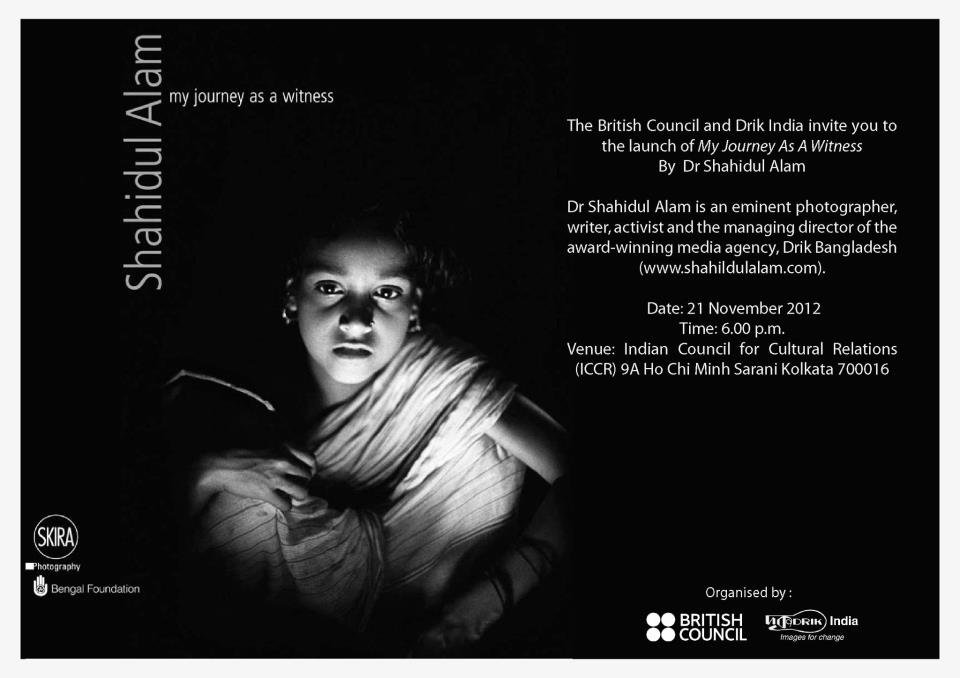
British Council and Drik India cordially invite you to the launching of the book by Dr. Shahidul Alam ? My Journey As A Witness? followed by lecture presentation of the artist.
Dr. Shahidul Alam is an eminent photographer, writer, activist and the Managing Director of the award winning media agency Drik Bangladesh.
Date: 21 November,2012
Time: 6- 8 pm
Venue: Jamini Roy Gallery, 3rd floor, Indian Council for Cultural Relations (ICCR), 9A Ho Chi Minh Sarani, Kolkata 700 016 ( Opposite to US Consulate)?? with?Shahidul Alam.
Review of My journey as a witness by John G Morris

Commonwealth writers conversation
Hay Festival in Dhaka
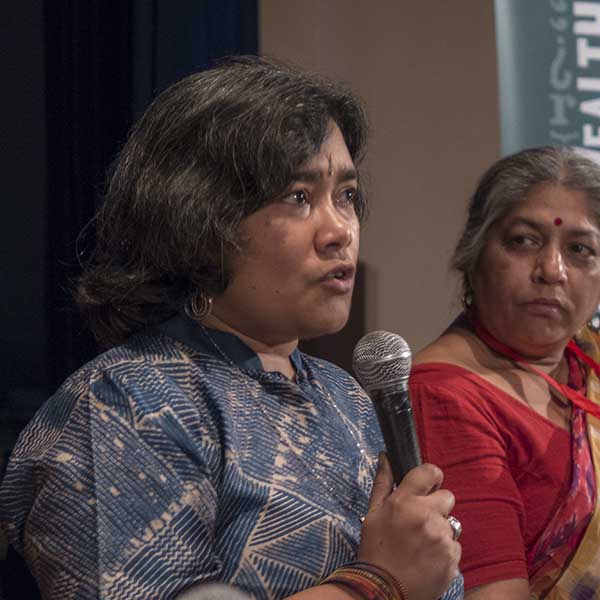
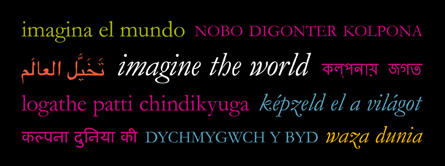
Our autumn festival odyssey across four continents begins in?Kenya, continues in?Spain, races on to?Mexico, then ventures to?Turkey, and on to?Bangladesh.
As we travel four continents we hope you will join us by downloading podcasts from each festival, signing up for our regular newsletters for monthly updates and following our international?Hay Festival blog?where writers from around the world offer their thoughts and reflections on the festivals they visit and the debates they take part in. We look forward to sharing our conversations, re-imagining the world with you.
About the festival
The Hay Festival presents a wonderful opportunity to create dialogue between leading British and Bangladeshi authors; I hope this event will herald a new wave of Bangladeshi writing as we bring some of the magic of Hay to Dhaka.?Tahmima Anam
Dhaka is the capital and largest city of Bangladesh. It is located in the geographic centre of the country, in the great deltaic region of the Ganges and Brahmaputra rivers. The city is within the monsoon climate zone, in one of the world?s leading rice and jute growing regions. Dhaka is divided into an old city and a new city.
Saturday?17?November
[148]?3:30PM?COMMONWEALTH?WRITERS?CONVERSATION:?Main?Stage
A?panel?chaired?by?Godfrey?Smith,?the?award-winning?writer?from Belize,?explores?how?artists?can?participate?in?the?mechanisms?which affect?our?lives and?what participatory?governance?really?means.?With writer?Farah Ghuznavi,?entrepreneur?Kamal?Quadir,?activist?Shireen Huq?and photographer?Shahidul?Alam.
Full programme?Please Retweet #hayfestdhaka
More images from DrikNews
Protest against Hay Festival in Dhaka
Kakababu choley gelen: Sunil Gangopadhyay (1934-2012)
by Udayan Chattopadhyay
That the passing of Sunil Gangopadhyay came as a shock to many ? despite his age and health ? is a reflection of his being, till his last Puja season during which he died ? the most prolific and recognizable mainstream writer in post-1947 Indian Bengal. Continue reading “Kakababu choley gelen: Sunil Gangopadhyay (1934-2012)”
Rubbing shoulders: Aung San Suu Kyi, Abbas Kiarostami, Gayatri Spivak
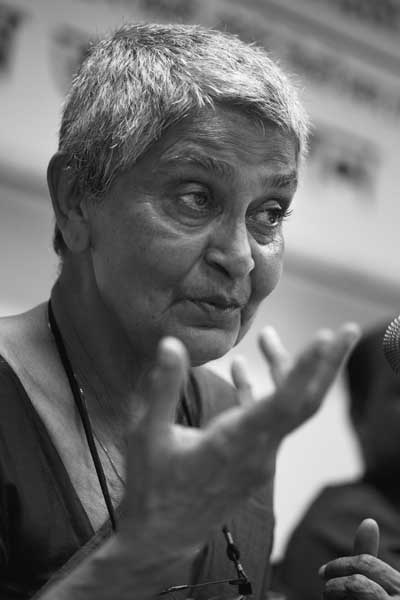
She was witty, connected, caring and sharp. Seamlessly moving between colloquial Bangla, bhodrolok Bangla and English, Spivak mesmerised, but did a few ticking offs too. All in her charming style so it took you a while to work out that a steam roller had gone over you. It was standing room only in packed seminar room at Dhaka University. Spivak was one of five visiting speakers, but clearly the one they had all come to see.
I was lucky as I had just returned from Tehran, when Rahnuma told me of the event, and Chulie and Yan managed to get my 100mm macro lens to me in time and I pedalled off to Dhaka University.
A couple of days back, I had made my way to Chiraz Square in Tehran to meet up with my old friend, the brilliant film maker and photographer Abbas Kiarostami. I returned with an arm load of books, including his early masterpiece, Snow White. Here are a couple of pictures from the book:

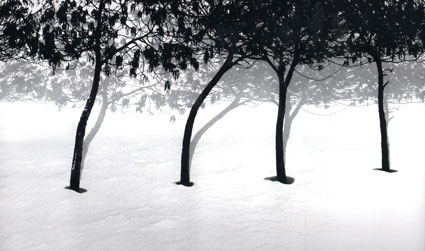
The meeting earlier with Aung San Suu Kyi, in Myanmar was opportunistic. But hey with people like that, one doesn’t care how it works out 🙂
Reading Faiz in Beirut
Beirut: Ornament of Our World: Faiz’s 1982 Poem on Beirut”
 [Faiz Ahmed Faiz.
[Faiz Ahmed Faiz.Reading Faiz in Beirut.
Faiz Ahmed Faiz (1911-1984) is one of the greatest Urdu poets of the 20th century. Born in Sialkot, Punjab, Faiz came of age under colonial rule and in the throes of nationalist anti-colonialism. He joined the British Indian Army; he was an integral part of the Progressive Writers Association. He wrote searing poetry about life, and revolution, taking older poetic forms and forging new idioms that chartered the emotions of socialism. When Pakistan was formed in 1947, Faiz went in two directions: as editor of Pakistan Times he was central to the creation of democratic mainstream institutions, as a communist intellectual he was part of the formidable attempt to create democratic culture in the new country. Both tasks floundered as Pakistan entered its unforgiving political grammar: the twenty something families that dominate the economy and polity subverted the democratic process by a turn to the Barracks, backed to the hilt by the United States imprisoned in its own Cold War calculus. Faiz went to prison. Pakistan, he wrote, has been ?sold to the neo-imperialist block.? By the 1970s, when the dictatorship of Zia thwarted any democratic possibility, Faiz was put under house arrest. Feigning to go smoke a cigarette, the poet escaped his captor and fled the country. He became the editor of the Afro-Asian magazine, Lotus, and became a resident in Beirut. Continue reading “Reading Faiz in Beirut”
Journeying with Mahasveta Devi
This is a sequel to an earlier film ‘Journeying with Mahasveta Devi’, and the second in the trilogy being made on the Magsasay Award winning writer-activist made by Drik India. The viewed and the viewer, the act and the response, form the basic pattern of this film and closes up further with both the inner-self and the outer-self of Mahasveta Devi.
The film has been selected in the international?competitive?section at Mumbai International Film Festival 2012.
Subcontinental drift
Subscribe to ShahidulNews
By Salil Tripathi
Does the controversial book about Bangladesh?s war of liberation uncover new truths, or simply reverse old biases?
It is an article of faith in Bangladesh that three million people died in its war of independence in 1971. At that time, the population of the former East Pakistan (which became Bangladesh) was about 70 million people, which means nearly 4% of the population died in the war. The killings took place between 25 March, when Pakistani forces launched?Operation Searchlight, and mid-December, when Dhaka fell to the invading Indian Army and the Mukti Bahini forces (who was aiding whom depends on which narrative you read? India?s or Bangladesh?s). As per Bangladesh?s understanding of its history, the nation was a victim of genocide. Killing three million people over 267 days amounts to nearly 11,000 deaths a day. That would make it one of the most lethal conflicts of all time.
One of the most brutal conflicts in recent years has been in the Democratic Republic of Congo, where the International Rescue Committee reported that 5.4 million people died between 1998 and 2008. A more thorough Canadian analysis now concludes that the actual figure is about half. At 5.4 million deaths, the daily death toll would be around 1,500; at 2.7 million, around 750. Was the 1971 war up to 15 times more lethal than the Congolese conflict?

A history of violence: A scene from the bloody conflicts of the 1971 Bangladesh war. Photo: Getty Images
It is an uncomfortable question. Many Bangladeshis feel that raising such a doubt undermines their suffering and belittles their identity. But a thorough, unbiased study, going as far as facts can take the analysis, would be an important contribution to our understanding of the subcontinent?s recent history.
Continue reading “Subcontinental drift”


